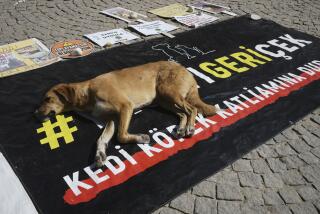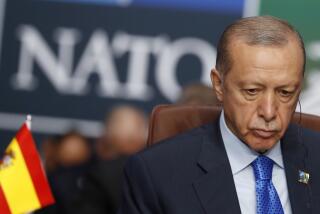Turkey Passes Hotly Debated Reforms to Ease Entry to EU
- Share via
ANKARA, Turkey — Turkey’s parliament abolished the death penalty and legalized education and broadcasts in the Kurdish language early today, moves aimed at improving the country’s chances of joining the European Union.
Parliament sounded more like a soccer stadium than a lawmaking body during a marathon debate that began Friday, with pro-EU legislators and nationalists opposed to the reforms shouting at each other. But finally, a show of hands voted in the reforms.
The EU had made the changes a condition for Turkey’s joining the union after making it a candidate for membership in 1999. Deep divisions within Turkey over the reforms had deadlocked the government in recent months and fueled a political crisis.
Legislators rushed to pass the legislation in an emergency meeting after parliament this week approved general elections for November, 18 months early.
The EU is scheduled to draft a report on Turkey’s progress on reforms in October. In December, the EU hopes to complete enlargement talks with about 10 candidate countries. Turkey wants to clinch a date for a start of membership talks at that summit.
“We are happy that the death penalty is being lifted in Turkey,” Prime Minister Bulent Ecevit said.
The 14-point reform package was passed despite sharp opposition from the nationalists, the largest grouping in parliament, who want the death penalty applied to Abdullah Ocalan, the jailed leader of Kurdish rebels.
During the sometimes angry debate, nationalist legislator Mehmet Gul derided his pro-EU colleagues, telling them that lifting the death penalty means “forgiving Ocalan and the terrorists.”
Turkey has not executed anyone since 1984, although courts impose death sentences. Fifty people are on death row.
The reform package replaces the death penalty with life imprisonment without the possibility of parole. Capital punishment remains on the books, however, for times of war.
The reforms also legalize long-banned TV and radio broadcasts in the Kurdish language and allow Kurdish and other regional dialects to be taught in special courses.
The package also expands freedom of expression, the right of association, and imposes stricter penalties on human traffickers.
It allows non-Muslim minority communities such as Greeks, Armenians and Jews greater rights over religious property, such as churches.
The reforms also amend regulations governing the police--frequently accused of human rights abuse.
More to Read
Sign up for Essential California
The most important California stories and recommendations in your inbox every morning.
You may occasionally receive promotional content from the Los Angeles Times.










